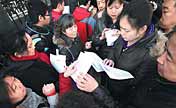
 |
| (File Photo) |
Edited and translated by Liang Jun, People's Daily Online
Over the past fifteen years, China's online population increased from 620,000 in 1997 to 564 million in 2012, amounting to nearly half of China's total population, according to relative figures.
An Internet revolution is changing people's daily life
In 2012, the scale of China's online shopping transactions amounted to 1.3 trillion yuan, equal to the GDP of northern western China's Shannxi province of the whole year and reaching 6.2 percent of total retail sales of consumer goods. Online shopping express parcels accounted for two thirds of the total 5.7 billion express parcels in China this year.
Li Yongzhuang, director of the Livelihood Economy Research Center at the Central University of Finance and Economics, thinks with the improvement of the payment methods and logistic system, convenient and cost-effective advantages of e-commerce are becoming more and more obvious, while the traditional shopping malls are to become the "fitting room" of e-commerce platform.
Meanwhile, the proportion of B2C (business- to- consumers) model in the online transactions continues to increase and amounting to 30 percent of all transactions in 2012, which shows online shopping is growing and large online shopping marketplaces are rising.
Online shopping is only a small part of e-commerce. In 2011, China's transaction scale of e-commerce market reached 7 trillion yuan, accounting for 14.8 percent of that year's GDP; in the first three quarters of 2012, the figure increased to 5.63 trillion yuan, contributing to a 15.9 percent of the GDP of the same period.
Zhang Yi, CEO of iiMedia Research, believes that in terms of business, the biggest role of Internet is to break information barrier, lowering communication cost and optimize resource allocation.
With the further popularization of webs, Internet will have a revolutionary impact on China's commercial activities.

Read the Chinese version: 中國經濟互聯網變革:電子商務顛覆傳統商業業態
















 Year's first rainfall for Beijing
Year's first rainfall for Beijing


![]()
